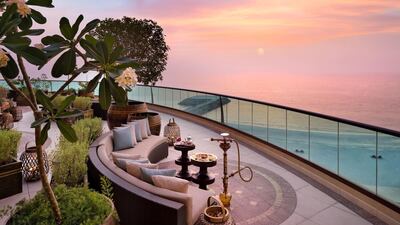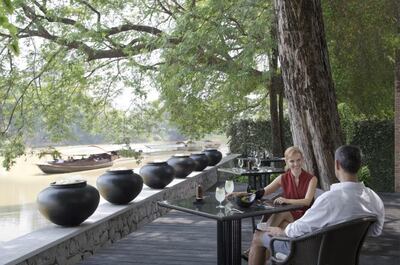As travel restrictions and country-wide lockdowns begin to ease in some parts of the world, hotels are having to rethink how they run their operations and engage with guests.
In the UAE, as restraints on the movement of residents have been relaxed, some hotels have resumed limited operations and are following strict safety guidelines.
The Fairmont Ajman reopened on Thursday, April 30, after being closed for a month, but will only run at 30 per cent capacity. As well as reopening its pools (with social distancing measures observed by ensuring sun beds remain at least two metres apart), the hotel will also operate three restaurants for limited hours, with a la carte menus only.

Elsewhere in the northern emirates, Oberoi Beach Resort Ajman has opened its beach and pool, but is only offering in-room dining; and the Radisson Blu Resort Ajman will allow visitors to its swimming pool and one restaurant. Both have started welcoming guests.
So what does hospitality – an industry that relies on human contact and involves countless strangers coming together under one roof – look like in the Covid era? A number of UAE hotels that The National approached declined to respond to how they are adapting their operations amid the pandemic.
However, transparency will be key if these hotels expect guests to return to their properties. At a time of great uncertainty, brands (across all industries) will need to reassure customers by being clear and open. Hotel guests will want to know exactly what is being done to keep them safe before they start booking again.
For the time being, reduced capacity, limited facilities and minimal staff contact will be the order of the day. And buffets will remain firmly off the cards (in fact, one has to wonder if this pandemic will signal the death knell of the buffet, already deemed a spread of unnecessary wastefulness).
Christian Clerc, president of global operations for Four Seasons Hotels and Resorts, acknowledges that the hospitality industry will face a new set of realities once guests start returning. In the UAE, the brand's Four Seasons Hotel Abu Dhabi and Four Seasons Resort Dubai at Jumeriah Beach remain open with limited services and facilities, while Four Seasons Hotel Dubai International Finance Centre remains closed.
"Once business levels resume, we recognise that the expectations and needs of hotel guests will have changed, and Four Seasons is well positioned to emerge from this crisis with a new perspective on what luxury means for this new world: embracing technology, enhancing tools and training and strengthening our already stringent health, safety and cleanliness protocols," says Clerc.
"We will continue our emotionally intelligent drive towards technological innovation. While we will limit face to face interactions, we will remain connected with our guests. Our already popular app and chat will be an important part of this new reality, providing a contactless and controlled experience that doesn’t compromise Four Seasons signature service," Clerc says.
The hotel chain is building on lessons learnt at three of its properties, Four Seasons Hotel New York, Four Seasons Hotel Riyadh at Kingdom Centre and Four Seasons Hotel Mumbai, which have been providing complimentary accommodation to medical personnel who have been working on the frontlines of the COVID-19 pandemic.
Enhanced cleaning operations will become the mainstay of any hotel expecting to successfully lure back visitors while Covid-19 rages on.
Hilton has teamed up with UK's Reckitt Benckiser, maker of Lysol and Dettol, and the Mayo Clinic's infection prevention and control team, to improve its cleaning and disinfectant protocols in properties around the world.
Due to be begin from June, the Hilton Clean Stay with Lysol protection programme, as it will be called in the US, is in response to research that shows consumers currently have heightened concerns regarding hygiene on their journeys, and that trust in cleanliness standards will be critical to restarting travel.

Hilton's rejigged cleaning protocols include a number of initiatives, such as the Hilton CleanStay Room Seal, a seal on doors to indicate to guests that their room has not been accessed since being thoroughly cleaned. There will be renewed focus on 10 high-touch, deep-clean areas in rooms, including light switches, door handles, TV remotes and thermostats.
Unnecessary amenities, such as pens, paper and guest directories, will be removed from rooms and made available upon request or supplemented with digital versions.
There will be improved guidelines for disinfecting the hotels' fitness centres, which may mean they are closed for cleaning many times a day and will involve limiting the number of guests allowed in at any one time. Disinfectant wipes will be provided in key areas across the properties – for example near lifts, so guests can wipe the elevator button before pressing it.
Contactless check-in and arrival experiences will be available, and hotel staff will be provided with personal protective equipment and enhanced training. "Our first priority has always been the safety of our guests and team members," says Christopher Nassetta, president and chief executive of Hilton.
“Hilton Clean Stay builds on the best practices and protocols we have developed over the last several months, allowing our guests to rest easy with us and focus on enjoying the unforgettable experiences we have to offer – while protecting our team members, who are on the front lines of hospitality.”
Meanwhile, Anantara has released details of its Stay with Peace of Mind programme, which includes higher levels of sanitation, with the use of Environmental Protection Agency-approved disinfectants in public areas and guest rooms. The hotel chain will also use electrostatic spray technology, to achieve greater coverage of its cleaning solutions.
Guest experiences will be tweaked to adapt to the current times. For example, guests who book airport limousine transfers will be met by an Anantara airport representative and escorted to their private vehicle, which will be thoroughly sanitised after every trip.
Visitors' luggage will be stowed in the limousine by the airport representative, while the driver will wear a face mask and not handle any bags. Any pending guest details required for check-in will be collected during the transfer, so that formalities can be completed quickly upon arrival, with minimal time spent in the lobby.
In restaurants, food will be prepared "a la minute", with no buffets in sight, while specialised wellness chefs can prepare meals and juices to help guests naturally boost their immune system. And for those still keen to do a spot of shopping on their trip, guests will be able to book personal shopping time slots at selected boutiques within or near the hotel, with either a very limited number or no other shoppers in the outlet at the same time.
Such changes are being made at all levels of the hospitality industry. Airbnb has also developed new cleaning protocols for its hosts, with guidance from former US surgeon general Dr Vivek Murthy, and other experts in hospitality and medical hygiene.
The protocol involves supplying specific information on Covid-19 prevention, such as the use of protective gear for hosts or their cleaners, as well as disinfectants that are approved by regulatory authorities. A recommended 24-hour wait period before entering is also required. Guests will be able to search for and easily identify Airbnb listings that are part of the programme.
If hosts are unable to commit to the new protocol, they can opt into a new feature called Booking Buffer, which initiates a vacancy period between stays. Hosts can commit to keeping their home empty for a set period in between stays, with no activity other than cleaning allowed. Reservations will be automatically blocked during that time frame, currently set at 72 hours.

“As a society, we need to observe the physical distancing recommendations made by public health officials while finding ways to preserve and strengthen human connection,” said Dr Murthy.
"I'm looking forward to helping the Airbnb community as it develops a health and science-based approach for safe travel and lodging experiences. These approaches will continue to evolve as our knowledge and understanding of Covid-19 grows."
Airbnb is optimistic about a rebound in business, citing booking data from late March that shows the number of reservations beginning at least six months in advance was greater in comparison to the same time last year.
The company is also buoyed by Skift travel researcher's report US Travel Tracker for March 2020, which predicts the pandemic "will make people drawn to activities and experiences that involve less exposure to crowds, more control of their surroundings and more assurances of cleanliness, at least in the short term".





